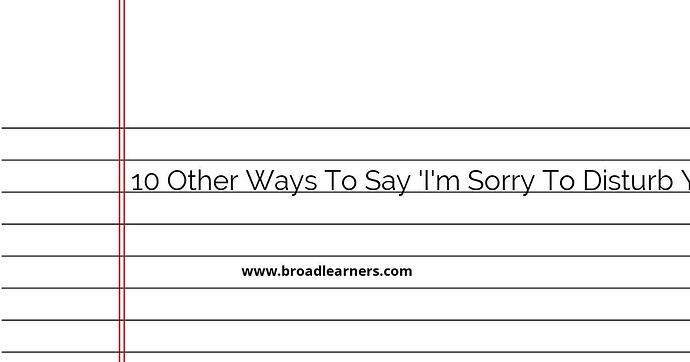When you need to interrupt someone or ask for their attention, it's important to be polite and respectful. Instead of saying 'I'm sorry to disturb you,' you can use these alternative phrases to convey your message:
- Excuse me for interrupting
- Apologies for the interruption
- May I have a moment of your time?
- Pardon the interruption
- Forgive me for the inconvenience
- Is now a good time to chat?
- Would you mind if I ask a quick question?
- Do you have a moment to spare?
- Can I bother you for a moment?
- May I disturb you for a brief moment?
Each of these phrases can be used in different contexts and situations. Here are some examples to help you understand how to use them:
1. Excuse me for interrupting
This phrase is commonly used when you need to interrupt someone briefly. It shows that you acknowledge the interruption and apologize for it.
Example: Excuse me for interrupting, but I have an urgent question that requires your attention.
2. Apologies for the interruption
By using this phrase, you express your regret for interrupting the person and acknowledge that it may inconvenience them.
Example: Apologies for the interruption, but I need to discuss an urgent matter with you.
3. May I have a moment of your time?
This polite request gives the person an opportunity to decide if they are available to give you their attention.
Example: May I have a moment of your time? I need your input on a project we're working on.
4. Pardon the interruption
Using this phrase shows that you recognize the interruption and seek forgiveness for it.
Example: Pardon the interruption, but I have some important information to share with you.
5. Forgive me for the inconvenience
If you feel that your interruption may cause inconvenience to the person, this phrase shows your understanding of the situation and asks for forgiveness.
Example: Forgive me for the inconvenience, but I need your assistance with a problem.
6. Is now a good time to chat?
This question allows the person to determine if they are available to talk at that moment.
Example: Is now a good time to chat? I have a quick question for you.
7. Would you mind if I ask a quick question?
This polite request asks for permission to ask a question, respecting the person's time.
Example: Would you mind if I ask a quick question? I need some clarification on a project.
8. Do you have a moment to spare?
By asking if the person has a spare moment, you give them the option to choose when to give you their attention.
Example: Do you have a moment to spare? I'd like to discuss a new idea with you.
9. Can I bother you for a moment?
Using this phrase shows that you are aware of potentially inconveniencing the person, but you still need their attention.
Example: Can I bother you for a moment? I need your expertise on a problem I'm facing.
10. May I disturb you for a brief moment?
This polite request acknowledges that you are interrupting the person, but you hope it will only be for a short period of time.
Example: May I disturb you for a brief moment? I have an important update to share with you.
Using these alternative phrases will help you convey your message with politeness and respect, maintaining a positive professional relationship with the person you are contacting.
Did I miss anything? Respond below
